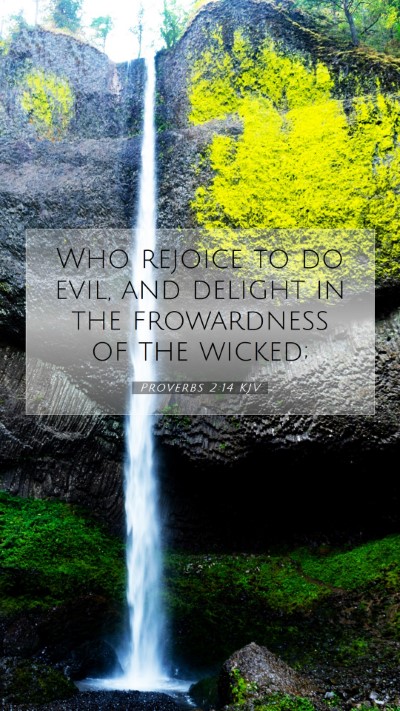Understanding Proverbs 2:14
Proverbs 2:14 states, "Who rejoice to do evil, and delight in the frowardness of the wicked." This verse provides a critical insight into the nature of wicked individuals, emphasizing their reality of finding pleasure in wrongdoing and mischief. This commentary synthesizes insights from renowned biblical scholars including Matthew Henry, Albert Barnes, and Adam Clarke to explore the deeper meanings behind this scripture.
Bible Verse Meaning
This verse reflects the profound moral degradation of those who take joy in sin. It highlights the stark contrast between the righteous and the wicked and serves as a cautionary reminder for believers. Here are some key points:
- Delight in Evil: Both Henry and Clarke emphasize how the wicked take pleasure in their sinful acts, suggesting a heart that is far removed from God’s righteousness.
- Rejoicing in Frowardness: The term "frowardness" signifies a willful perversion of justice and goodness. Barnes notes that this indicates a deliberate choice to embrace morality's opposite.
- Character of the Wicked: The wicked are described as those who might even derive a sense of triumph from the downfall of others. This character trait serves as a warning to believers about the nature of evil and its seductive allure.
- The Importance of Wisdom: The preceding verses of Proverbs 2 emphasize the necessity of seeking wisdom and understanding, contrasting the fate of the wise with that of the wicked.
Bible Verse Interpretations
Interpretatively, Proverbs 2:14 can be seen as a reflection on the human condition and the battle between good and evil. The following insights can be drawn:
- Joy in Sin: There is a natural inclination in some individuals to find joy in acts that are contrary to God’s laws, leading them away from divine truth.
- Sociocultural Context: The verse plants its roots in a sociocultural context where morality was upheld, thus denouncing those who celebrate vice.
- The Call to Righteousness: This serves as an exhortation to individuals to examine their own hearts and thoughts, ensuring they do not fall into the same patterns of delight found in wickedness.
Biblical Exegesis
Exegesis of Proverbs 2:14 digs into the textual structure, word studies, and the overarching narrative of Proverbs. Here's what emerges:
- Textual Analysis: The juxtaposition of “rejoice” and “delight” juxtaposed with “evil” and “frowardness” creates a vivid image of active participation in sin.
- Language and Imagery: The Hebrew terms used in this verse carry significant weight, as they express not just actions but also heart attitudes that welcome iniquity.
- Surrounding Verses: Understanding the surrounding verses gives clarity to the path that leads to either wisdom or folly—a route that is extremely consequential.
Application of Proverbs 2:14
Practically speaking, applying the teachings of Proverbs 2:14 involves the following:
- Self-Reflection: Individuals are encouraged to reflect on what they find joy in—whether it aligns with God’s will or strays into sinful territory.
- Avoidance of Wickedness: The verse serves as a protective boundary, advising believers to avoid settings and situations that foster wicked actions or thoughts.
- Engagement with Godly Wisdom: Actively pursue wisdom and understanding through prayer, study, and fellowship with those who encourage righteousness.
Additional Insights from Commentaries
Matthew Henry draws attention to the idea that the wicked are not merely passive in their evil; they actively engage in it, which leads to a deeper level of condemnation. Additionally, Albert Barnes points out the societal implications of such wickedness, underscoring how it can spread and influence others negatively. Adam Clarke emphasizes the psychological aspect, suggesting that the delight in sin can also lead to desensitization to further degradation.
Cross References
This verse resonates with other scriptural passages that echo its themes:
- Psalm 37:1-2 - Encouragement to not fret over evildoers.
- Proverbs 10:23 - Clarifies the difference in motivations between the wise and the wicked.
- Romans 1:32 - Discusses the consequences of embracing unrighteousness.
Conclusion
Proverbs 2:14 serves as a stark warning and an opportunity for self-examination for those on their spiritual journey. By understanding this verse in the light of biblical commentaries, believers can gain insights that encourage them in their pursuit of wisdom and righteousness. Exploring the meanings behind Bible verses enriches one’s faith and strengthens one’s walk with God.


